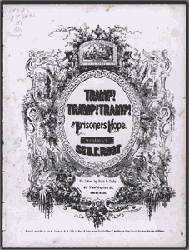


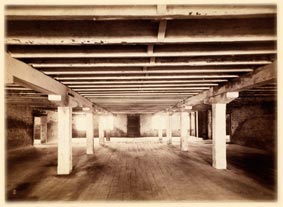
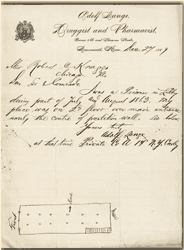
Prisoners inside the tobacco warehouses fared better than their compatriots on Belle Isle.
John Ransom, a Belle Isle prisoner who eventually became the manager of the Libby Prison War Museum, kept a diary during his confinement on the island:
It is a cold, bleak piece of ground and the winter winds have free sweep from up the river...About half of the six thousand prisoners here have tents while the rest sleep and live out of doors...A large portion of the prisoners who have been in confinement any length of time are reduced to almost skeletons from continued hunger, exposure and filth...Stormy and disagreeable weather. From fifteen to twenty and twenty-five die every day and are buried just outside the prison with no coffins... (RANSOM, 6-11)
Advertisement for Libby Prison Hotel, Libby Prison War Museum Catalogue, 1893; bracelet made from human bones by prisoner at Libby and Belle Isle, Charles F. Gunther Collection, c. 1864.
To Capt. Soldier Diehl, the man with red mustache, and the other guards -- As I visited the Prison Feb. 24, for the first time, I was very much interested and learned a great deal...I was very much interested in the Lincoln exhibit...and in a beautiful ornament -- a bracelet made by a "Yankee" soldier out of human bones. Yours respectfully, Pauline Erlberry, 335 West Fullerton Ave. (LP CHRONICLE, MAY 1894)
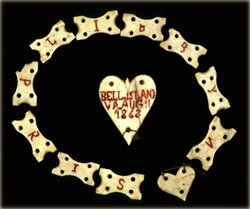
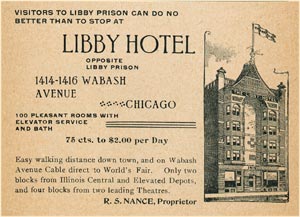
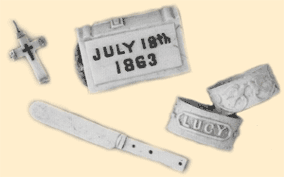
Many of the prisoners carved trinkets from bone or wood during their long hours of confinement. William Powell, an officer imprisoned at Libby, wrote:
During my stay in Libby I had taken some lessons in carving from Professor and Lt. Col. Henry, an expert engraver, and under his tuition succeeded in making for each of my children, neatly finished, napkin rings out of the rebel beef shank bones - also a representative bible-formed pin cushion for my wife...Also one large paper folder or knife, decorated in work with the following inscription, neatly cut:
Presented
to Abraham Lincoln President of the United States of
America by Col. W.H. Powell...Libby Prison 1863.
(POWELL
164)
Music was a welcome distraction for the prisoners, who often entertained each other as well as their Confederate captors.
Night coming on a stalwart cavalry man produced a "debilitated" old violin and a space being cleared we amused ourselves with a...display, consisting of jigs, clogs, reels, hornpipes, and winding up with a regular "stag dance."
-- Private Charles Colvin, Pemberton Prison
![]()
We had a fine Glee Club of which Chaplain McCabe and myself were members, who used to make Libby Prison ring with the sounds and words of our Union war songs, such as "We're coming, Father Abraham,"..."Tramp, Tramp, Tramp, The Boys are Marching," "Rally Round the Flag, Boys," and the "Battle Hymn of the Republic." To all of which many a rebel foot beat time, unconsciously, as if it had never stepped to any but the music of the Union. It was in this way that we made life in Libby possible and tolerable.
--Colonel William Powell, Libby Prison
Harmonica played at Libby Prison, Charles F. Gunther Collection (CHS XA-2325);

We were conducted to the "secluded retreat" assigned to us during our residence in the city -- an old tobacco warehouse...well known to all prisoners by the title of "Pemberton Castle..."We looked about the crowded room for a vacant spot upon which to "squat." We found a small space unoccupied and forthwith deposited ourselves there upon, and closing our eyes, prepared to resign ourselves into the soft arms of sleep. But though nearly worn out with the hardships of the preceding three days...the noise and trampling of many feet upon the floor, the busy hum of hundreds of voices -- a miniature Babel...all combined refused to weigh my eyelids down, or draw my senses in forgetfulness. I lay too snug upon my uneasy couch -- a soft plank, with my boots for a pillow...Owing to the crowded condition of the prisoners we were compelled to lie "spoon" fashion.
The Chickamauga room in Libby Prison, c. 1880 (ICHi-31070); letter from ex-prisoner of war Adolf Lange to the manager of the Libby Prison War Museum requesting a brass plate to mark his sleeping place in the Chickamauga room, 1889 (ICHi-31084); "Spooning, 'Tenshun! Prepare to Flop!," The Story of Libby Prison, c. 1890 (ICHi-30968).
Brass plates commemorated the sleeping places of thousands of ex-prisoners on the floors of the Libby Prison War Museum.

Tramp!
Tramp! Tramp!
The Prisoners Hope.
Choose the option below that matches your Internet connection:

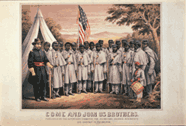


You
will need QuickTime to play the music in this section.
Click here to download and install QuickTime.
